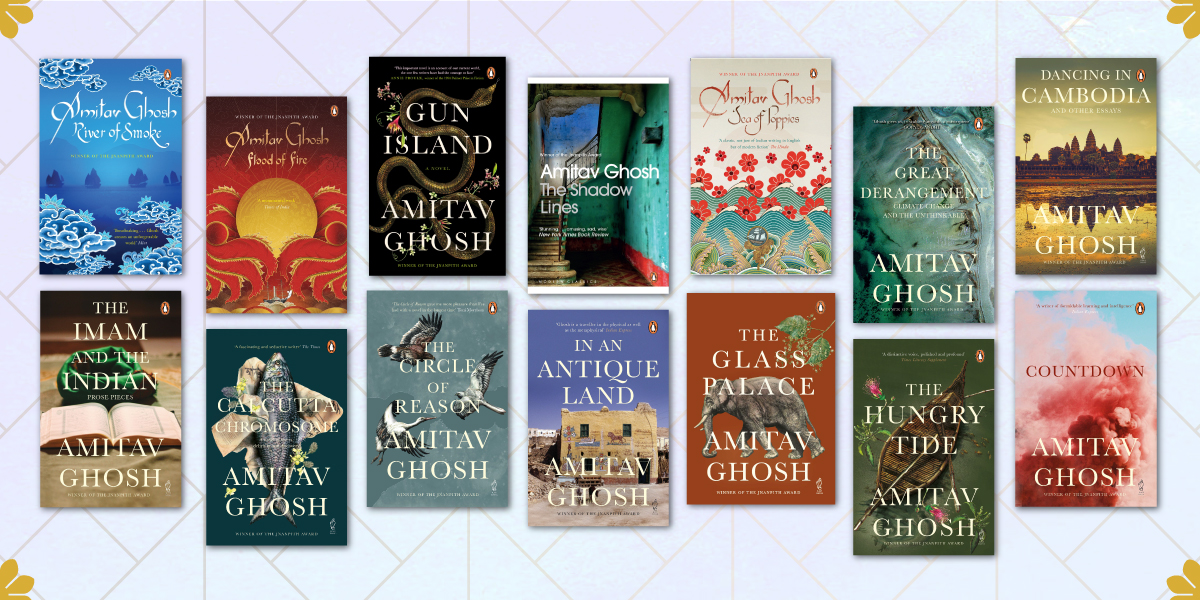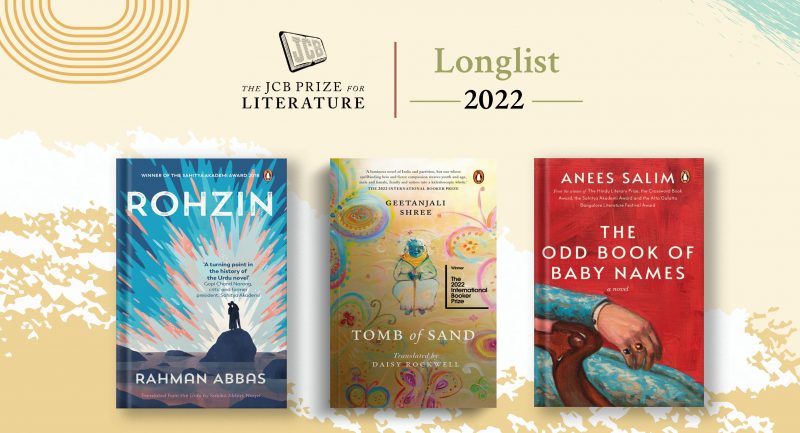
Amitav Ghosh is a name that needs no introduction, but being proponents of his literary art form, we find ourselves compelled to acquaint you with his life and accomplishments. For those who already know this, think of it as a refresher course.
Born in Calcutta during the summer of 1956, Ghosh spent his formative years hopping from place to place thanks to his father’s military background. He had the opportunity to experience living in Bangladesh, Sri Lanka and India. He studied at the Universities of Delhi and Oxford and has been awarded multiple honorary doctorates. In addition to these impressive qualifications, he has been the receiver of numerous awards, including the Jananpith Award, the highest and oldest literary award in the country.
He possesses the ability to spin words in ways that create the most captivating tapestries, often using ornamental English, elevating his literary works to what appears to be high art and literature. Though he does not confine himself to one genre, a theme that often appears in his work is that of untold histories, ones that no one else sought to pursue. This is what he does in his newest piece of writing, The Nutmeg’s Curse, where he reveals the profoundly remarkable ways in which human history is shaped by non-human forces.
Yes, we are all extremely excited about this book, but since we have to wait a few days before we can get our hands on it, here are a few (easy to obtain) Amitav Ghosh classics everyone ought to read!
~

Gun Island
Bundook. Gun. A common word, but one which turns Deen Datta’s world upside down.
A dealer of rare books, Deen is used to a quiet life spent indoors, but as his once-solid beliefs begin to shift and he is forced to set out on an extraordinary journey. A journey that takes him from India to Los Angeles and Venice via a tangled route through the memories and experiences of those he meets along the way. There is Piya, a fellow Bengali-American who sets his journey in motion; Tipu, an entrepreneurial young man who opens Deen’s eyes to the realities of growing up in today’s world; Rafi, with his desperate attempt to help someone in need and Cinta, an old friend who provides the missing link in the story they are all a part of. It is a journey that will upend everything he thought he knew about himself, about the Bengali legends of his childhood and about the world around him.
Gun Island is a beautifully realised novel that effortlessly spans space and time. It is the story of a world on the brink of increasing displacement and unstoppable transition. However, it is also a story of hope of a man whose faith in the world and the future is restored by two remarkable women.

Sea Of Poppies
A motley array of sailors and stowaways, coolies and convicts is sailing down the Hooghly aboard the Ibis on its way to Mauritius. As they journey across the Indian Ocean old family ties are washed away, and they begin to view themselves as jahaj-bhais or ship brothers who will build new lives for themselves in the remote islands where they are being taken.
A stunningly vibrant and intensely humane work, Sea of Poppies, the first book in the Ibis trilogy, confirms Amitav Ghosh’s reputation as a master storyteller.

River of Smoke
September 1838. A storm blows up on the Indian Ocean and three ships – the Ibis, the Anahita and the Redruth – and those aboard are caught in the whirlwind.
River of Smoke follows the fortunes of these men and women to the crowded harbours of China where they struggle to cope with their losses – and for a few, unimaginable freedoms – in the alleys and teeming waterways of nineteenth-century Canton.
Written on the grand scale of a historical epic, River of Smoke, book two in the Ibis trilogy, will be heralded as a masterpiece of twenty-first-century literature.

Flood of Fire
It is 1839. The British, whose opium exports to China have been blockaded by Beijing, are planning an invasion to force China’s hand. In Calcutta, Zachary Reid, an impoverished young sailor, dreams of his lost love and of a way to make his fortunes. Heading towards Calcutta is Havildar Kesri to lead a regiment of Indian volunteers in the upcoming war. In Mumbai, Shireen Modi prepares to sail alone to China to reclaim her opium trader husband’s wealth and reputation.
In Canton, Neel becomes an aide and translator to a senior Chinese official as Beijing begins to prepare for war with Britain and the more he sees, the more worried he becomes for the Chinese have neither the ships nor the artillery to match the British in modern warfare. The future seems clear but do the Chinese know it?

The Shadow Lines
As a young boy, Amitav Ghosh’s narrator travels across time through the tales of those around him, traversing the unreliable planes of memory, unmindful of physical, political and chronological borders. But as he grows older, he is haunted by a seemingly random act of violence. Bits and pieces of stories, both half-remembered and imagined, come together in his mind until he arrives at an intricate, interconnected picture of the world where borders and boundaries mean nothing. They are mere shadow lines that we draw dividing people and nations.
Out of a complex web of memories, relationships and images, Amitav Ghosh builds an intensely vivid, funny and moving story. Exposing the idea of the nation state as an illusion, an arbitrary dissection of people, Ghosh depicts the absurd manner in which your home can suddenly become your enemy.

The Great Derangement
Are we deranged?
Amitav Ghosh, argues that future generations may well think so. How else can we explain our imaginative failure in the face of global warming? In this ground-breaking return to non-fiction, Ghosh examines our inability-at the level of literature, history and politics-to grasp the scale and violence of climate change. The climate crisis asks us to imagine other forms of human existence-a task to which fiction, Ghosh argues, is the best suited of all forms. The Great Derangement serves as a brilliant writer’s summons to confront the most urgent task of our time.

Dancing in Cambodia and Other Essays
Through extraordinary first-hand accounts Amitav Ghosh presents a compelling chronicle of the turmoil of our times.
Dancing in Cambodia recreates the first-ever visit to Europe by a troupe of Cambodian dancers with King Sisowath, in 1906. Ghosh links this historic visit, celebrated by Rodin in a series of sketches, to the more recent history of the Khmer Rouge revolution.
‘The Town by the Sea’ records his experiences in the Andaman and Nicobar Islands just days after the tsunami; and in ‘September 11’ he takes us back to that fateful day when he retrieved his young daughter from school in New York, sick with the knowledge that she will be marked by the same kind of tumult that has defined his own life.

The Imam and the Indian
The Imam and the Indian is an extensive compilation of Amitav Ghosh’s non-fiction writings. Sporadically published between his novels, in magazines, journals, academic books and periodicals, these essays and articles trace the evolution of the ideas that shape his fiction. He explores the connections between past and present, events and memories, people, cultures and countries that have a shared history.
Ghosh combines his historical and anthropological bent of mind with his skills of a novelist, to present a collection like no other.

The Calcutta Chromosome
In this extraordinary novel, Amitav Ghosh navigates through time and genres to present a unique tale. Beginning at an unspecified time in the future and ranging back to the late nineteenth century, the reader follows the adventures of the enigmatic L. Murugan. An authority on the Nobel Prize-winning scientist Sir Ronald Ross, who solved the malaria puzzle in Calcutta in 1898, Murugan is in search of the elusive ‘Calcutta Chromosome’. With its astonishing range of characters, advanced computer science, religious cults and wonderful portraits of Victorian and contemporary India, The Calcutta Chromosome expands the scope of the novel as we know it, as Amitav Ghosh takes on the avatar of a science thriller writer.

The Circle Of Reason
Following the form of the raga in Indian classical music, Amitav Ghosh slowly builds the tempo of The Circle of Reason. The first part spans several decades, the second unfolds over a few weeks, and the third, like a scherzo, races through a day. Ghosh’s debut novel centres on Alu, an orphan enlisted by his foster father as a soldier in his crusade against the forces of myth and unreason. Suspected of terrorism, they are about to be arrested when a tragic accident forces Alu to flee his village. Pursued by a misguided police officer, Alu finds his way through Calcutta to Goa and on to a trawler that runs illegal immigrants to Africa. Tracing Alu’s journey across two continents, The Circle of Reason is an exceptional novel by one of India’s most celebrated writers in English.

In An Antique Land
Packed with anecdotes and exuberant details, In an Antique Land provides magical and intimate insights into Egypt from the Crusades to Operation Desert Storm. It exposes the indistinguishable and intertwining ties that bind together India and Egypt; Hindus, Muslims and Jews.
By combining fiction, history, travel writing and anthropology, to create a single seamless work of imagination, Ghosh characteristically makes us rethink the political boundaries that divide the world and the generic boundaries that divide narratives.

The Glass Palace
Set in Burma during the British invasion of 1885, this masterly novel tells the story of Rajkumar, a poor boy lifted on the tides of political and social chaos, who goes on to create an empire in the Burmese teak forest. When soldiers force the royal family out of the Glass Palace and into exile, Rajkumar befriends Dolly, a young woman in the court of the Burmese queen, whose love will shape his life. He cannot forget her, and years later, as a rich man, he goes in search of her. Through this brilliant and impassioned story of love and war, Amitav Ghosh presents a ruthless appraisal of the horrors of colonialism and capitalist exploitation.

The Hungry Tide
Between the sea and the plains of Bengal, on the easternmost coast of India, lies an immense archipelago of islands. Some are vast and some no larger than sandbars; some have lasted through recorded history while others have just washed into being. These are the Sundarbans. Here there are no borders to divide fresh water from salt, river from sea, even land from water. The settlers of the Sundarbans believe that anyone without a pure heart who ventures into the watery labyrinth will never return. Survival is an everyday battle for these people who have managed to strike a delicate balance with nature.
But the arrival of Piyali Roy, of Indian parentage but stubbornly American, and of Kanai Dutt, a sophisticated Delhi businessman, threatens to upset this balance. Kanai has returned to the islands on the request of his aunt, a local figure, for the first time since the death of his uncle, a political radical who died mysteriously in the aftermath of a local uprising. When Piya, who is on the track of the rare river dolphins, hires Fokir, an illiterate but proud local man to guide her through the backwaters, Kanai becomes her translator. From this moment, the tide begins to turn.
Amitav Ghosh has discovered another new territory, summoning a singular, fascinating place, another world, from its history and myth, and bringing it to life. Yet The Hungry Tide also explores another and far more unknowable jungle: the human spirit. It is a novel that asks at every turn: what man can take the true measure of another?

Countdown
On 11 May 1998 the Indian government tested five nuclear devices some forty kilometers from Pokaran. Seventeen days later Pakistan tested nuclear devices of its own. About three months after the tests, Amitav Ghosh went to the Pokaran area, after which he visited Kashmir as part of the defense minister’s entourage. He also went to the Siachen glacier in the Karakoram Mountains where Indian and Pakistani soldiers have been exchanging fire since 1983. Ghosh then travelled through Pakistan and Nepal.
Countdown is partly a result of these journeys and conversations with many hundreds of people of the subcontinent. In its description the book is haunting and evocative; and its analyses of the compulsions behind South Asia’s nuclearization, and the implications of this, are profound, deeply disturbing and, ultimately, chilling.









